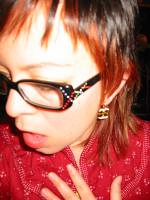Roskilde, Denmark, Autumn 2008
Race, Gender, and Nation: Immigration in Denmark and the United States
(Program dates: August 30, 2008 - December 15, 2008 -- 24 Credits
Sponsored by The Comparative History of Ideas Department)
A recent study named Denmark the happiest place on earth. That people in Denmark report a high degree of happiness isn’t surprising, given widespread economic prosperity and extensive government-funded healthcare, education and social service programs. Denmark is also a beautiful country—bounded by white sand beaches and fishing ports on all sides and filled with sprawling castles and parks and distinctively Danish modern art, architecture and design. But happiness isn’t the only thing that has recently put Denmark on the map. A set of cartoons of the Prophet Mohammad first published in a Danish newspaper in 2006 sparked protests across Europe and the Middle East over the unequal treatment of Muslim immigrants in Denmark as symbolic of their treatment around the world. And a country that has historically been defined by progressive politics and inclusivity is increasingly shutting its doors to immigrants; largely through the rise in power of a nationalist radical right party that is working to restrict Denmark’s public resources to ’ethnic Danes’ alone.
A set of cartoons of the Prophet Mohammad first published in a Danish newspaper in 2006 sparked protests across Europe and the Middle East over the unequal treatment of Muslim immigrants in Denmark as symbolic of their treatment around the world. And a country that has historically been defined by progressive politics and inclusivity is increasingly shutting its doors to immigrants; largely through the rise in power of a nationalist radical right party that is working to restrict Denmark’s public resources to ’ethnic Danes’ alone.
As in Denmark, immigration is currently a topic of widespread public discussion and concern in the United States. The U.S. Congress has been debating major immigration reforms, the U.S./Mexico border is increasingly fortified and militarized in the name of Homeland Security, and immigrant communities and families across the country are being split apart through detention and deportations. At the same time, unprecedented numbers of immigrants have been resisting their treatment by the U.S. government, employers, and everyday people as they march for immigrant rights and a path to citizenship.
Program Description
The interplay of race, gender and nation is paid little attention in popular and scholarly analyses of Danish and U.S. immigration. As the University of Washington’s first explicitly feminist study abroad program, this program will center the roles that race, gender and nation play in images and stories of immigration in Denmark and the United States in the context of contemporary inequalities of globalization.
Students enrolled in the program will live and take classes at Roskilde University (www.ruc.dk), which is 25 minutes by train from Denmark’s capital, Copenhagen. Regular program excursions to museums, neighborhoods and public and private organizations in Copenhagen and Roskilde will supplement students’ work in the classroom. All students will also work together to produce group projects that explore some aspect of race, gender, nation and immigration in the U.S. and/or Denmark. Students will have the opportunity to complete these projects in collaboration with public or non-governmental organizations. These projects could culminate in a long research paper, but students will also be encouraged to take a creative approach to the projects that incorporates, for example, visual art, literature, and/or documentary films.
Students will prepare for the study abroad program during Spring 2008 with a required 2 credit non-graded pre-departure seminar (CHID 496). This seminar will focus on feminist perspectives on race, gender and globalization and group learning in the context of study abroad. Study abroad in Denmark will begin August 30 and end December 15 2008.
This program is open to students from all backgrounds. All students are encouraged to apply.
Curriculum
Students will receive between 20 and 25 total UW credits in Women Studies or CHID for the following:
1. Roskilde University Cultural Encounters program core course (September 8 to October 3)
2. “Images and Stories of Immigration” thematic course (October 6 to November 7)
3. Students’ choice of one of three other Cultural Encounters thematic courses on ethnicity, nationalism, identity, religion and culture (October 6 to November 7)
4. Participation in program outings and assignments outside the classroom
5. Completion of group projects
Language Study
Students are strongly encouraged to take some Danish classes before or during the program. Options for doing this include:
1. Coming to Denmark two weeks before the program begins to take part in Roskilde’s introductory course for international students, which includes an introduction to Denmark and Roskilde’s unique approach to teaching and learning as well as introductory Danish lessons. The course runs from August 13 to August 27, 9:30 am to 2 pm every weekday. (Students would have to pay an additional cost--approximately $500 US--for this introductory course.)
2. Taking Danish classes at Roskilde Fall semester during the program
Note: students will receive additional credit for language study.
Details:
go to the CHID International page
Questions? Contact Laura Hart Newton: lnewlon@gmail.com
Monday, March 03, 2008
University of Washington study abroad opportunity!!
Posted by
manic hispanic
at
11:00:00 AM
![]()
Labels: activism, events, lessons, schoolisms, this i believe, vacation
Subscribe to:
Comment Feed (RSS)

|